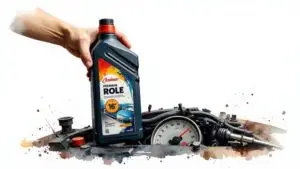The Hidden Workhorses: Understanding Your Car's Air Filters
Your car's air filters often go unnoticed, but they are essential for maintaining both engine performance and the health of your passengers. These filters act as the first line of defense, protecting your vehicle from dust, pollen, debris, and other airborne contaminants. Think of them as your car's lungs and nose, ensuring the engine breathes clean air and creating a healthier environment inside.
Types of Air Filters and Their Functions
Two main types of air filters work hard in your vehicle: the engine air filter and the cabin air filter. Located under the hood, the engine air filter prevents harmful particles from entering the engine's combustion chamber. This protection is vital for optimal fuel efficiency and prolongs the engine's lifespan. The cabin air filter, typically located behind the glove compartment or under the dashboard, cleans the air circulating inside the cabin. By removing pollen, dust, and other allergens, it creates a more comfortable ride, especially for those with allergies.
How Often Should You Change Your Car's Air Filter?
Regular air filter changes are key to maintaining optimal performance. Industry guidelines generally recommend replacing car air filters every 15,000 to 30,000 miles (24,000 to 48,000 kilometers). This ensures both peak engine performance and high air quality inside the vehicle. Under typical driving conditions, waiting up to 30,000 miles might be acceptable. However, if you frequently drive in dusty or off-road conditions, more frequent changes, around every 15,000 miles, are necessary. Cabin air filters, being smaller and exposed to more contaminants, typically need replacing once or twice a year. For helpful car maintenance tips, check out this resource: car maintenance tips. You can find more detailed information about air filter replacement intervals here. Remember, adjusting your filter maintenance based on your driving habits and the type of filter is crucial for the well-being of both your vehicle and its occupants.
The Importance of Regular Air Filter Replacement
Regularly replacing your air filters offers several important benefits. A clean engine air filter ensures proper airflow to the engine, optimizing fuel economy and preventing potential engine damage. This can lead to real savings on gas and avoid expensive repairs in the future. A fresh cabin air filter provides cleaner air inside your car, improving respiratory health and overall comfort, particularly during allergy season. It also helps maintain the efficiency of your vehicle's HVAC system. Ignoring air filter replacement can result in reduced engine performance, lower fuel efficiency, and a less pleasant cabin environment.
Real-World Replacement Schedules That Actually Work
Manufacturer recommendations for air filter changes often suggest a one-size-fits-all approach. However, real-world driving habits and environments significantly impact how often you should replace your filter. City driving, with its stop-and-go traffic, exposes your filter to more contaminants than highway driving, meaning more frequent changes may be necessary for city dwellers.
Mileage vs. Time: Finding the Right Balance
Your owner's manual offers a starting point, but relying solely on mileage can be misleading. Time is also a factor. Even with low mileage, a filter can accumulate dust and moisture over time, reducing its effectiveness. This is why checking your air filter every 12,000 miles or 12 months (whichever comes first) is a good rule of thumb. The filter's physical characteristics also play a role. Larger, thicker filters generally trap more dirt and have a longer lifespan. Common lifespans for engine air filters range from 3,000 to 12,000 miles or 3 to 12 months, depending on factors like size and quality. Learn more about air filter lifespans.
Premium Filters: Are They Worth the Investment?
Some premium air filters boast extended life and improved performance. While certain high-quality filters justify their higher cost with better filtration and durability, not all "premium" filters deliver on these promises. Consider your driving conditions and the filter type before opting for a more expensive option. A premium filter designed for harsh environments could be beneficial if you frequently drive on dusty roads.
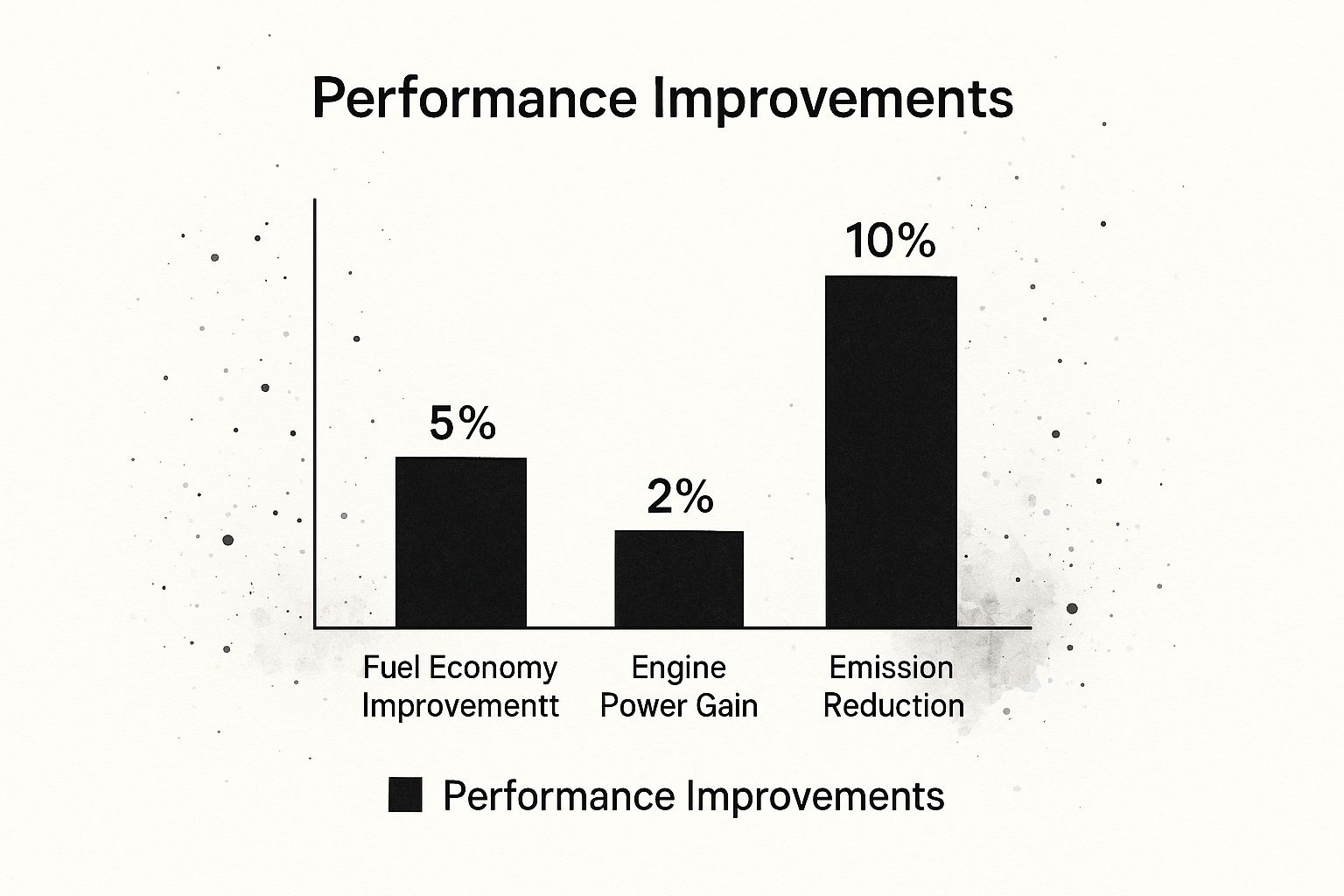
The infographic above highlights the potential benefits of regular air filter replacements. These include improved fuel economy (5%), increased engine power (2%), and reduced emissions (10%). While individually small, these improvements can accumulate over time, demonstrating the significant impact of this simple maintenance task.
To help understand the various recommended replacement intervals, let's look at the following table:
Air Filter Replacement Intervals by Type
This table compares the recommended replacement intervals for different types of air filters based on mileage, time, and driving conditions.
| Filter Type | Normal Conditions | Severe Conditions | Inspection Frequency |
|---|---|---|---|
| Standard Paper | 12,000 miles / 12 months | 3,000-6,000 miles / 3-6 months | Every 6,000 miles/6 months |
| Cabin Air Filter | 12,000-15,000 miles / 12 months | 5,000-10,000 miles / 6 months | Every 6,000 miles/6 months |
| High-Performance | 25,000-50,000 miles / 24-36 months | 10,000-15,000 miles / 12 months | Every 12,000 miles/12 months |
As shown in the table, standard paper filters typically require more frequent changes, especially under severe conditions. Cabin air filters and high-performance filters generally have longer lifespans, although regular inspection is still recommended.
Know Your Car's Specific Needs
Some car manufacturers are known to under- or overestimate air filter replacement intervals. Consulting a trusted mechanic can offer valuable, model-specific advice. This personalized guidance ensures you change your filter at the optimal time, preventing potential problems and avoiding unnecessary replacements. Regular inspections during routine maintenance, such as oil changes, also allow for assessing filter condition and making informed replacement decisions.
When Your Environment Demands More Frequent Changes
Your car's air filter isn't a one-size-fits-all solution. Its lifespan depends heavily on your driving environment, a factor often overlooked in general maintenance advice. Think about the difference between navigating a dust storm and cruising down a paved highway. It's obvious the filter will clog much faster in dusty conditions.
Urban Pollutants vs. Rural Dust
Urban environments, while appearing cleaner than dirt roads, pose their own challenges. Soot and smog, common in cities, can clog air filters surprisingly fast. Rural areas, while generally less polluted, expose filters to dust and pollen, particularly during harvest seasons. Coastal regions introduce another element: salt. Salt air can corrode filter materials, impacting their effectiveness. Drivers in these environments need to be extra attentive to their air filter's condition.
Extreme Climates and Filter Degradation
Extreme temperatures, both hot and cold, affect filter performance. Excessive heat can dry out filter materials, making them brittle and less effective. Extreme cold and humidity can create a breeding ground for mold and mildew within the filter itself. This highlights the importance of adjusting your maintenance schedule based on your climate.
Historically, many drivers have followed an approximate annual replacement cycle for air filters, particularly around 20,000 miles (32,000 kilometers) of yearly driving. Online forums and communities often recommend this yearly change for typical paved-road conditions. Manufacturer schedules commonly suggest replacing cabin air filters every 20,000 miles or 2 years and engine air filters every 30,000 miles or 3 years, whichever comes first. However, a condition-based approach, where the filter is inspected regularly and cleaned or replaced as needed, is becoming more common. This approach allows for flexibility based on driving conditions and location. Find more detailed information on air filter replacement practices here. For a helpful car maintenance guide, check out this car maintenance schedule by mileage.
Professional Driver Strategies
Professional drivers, particularly those in challenging environments, often have specific strategies to maximize filter life. Some use pre-filters to catch larger particles before they reach the main filter. Others keep spare filters on hand for quick changes on the go. These strategies underscore the importance of tailoring your maintenance to your specific driving situation.
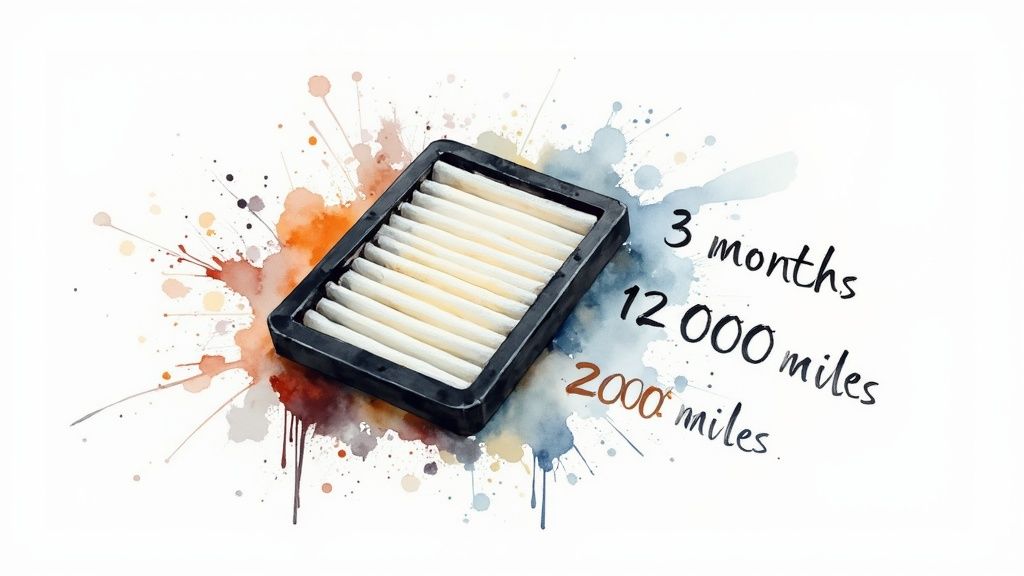
Understanding the environmental factors that affect your air filter is essential. By considering these factors and adapting your maintenance accordingly, you can ensure optimal engine performance, better fuel efficiency, and a healthier cabin environment.
Unmistakable Signs Your Filters Are Crying For Help
Beyond mileage recommendations, your car often provides clues that its air filters need attention. These signs can be subtle or quite obvious. Recognizing them can prevent costly repairs and maintain your car's efficiency.
Reduced Performance and Efficiency
One of the first signs of a clogged engine air filter is sluggish acceleration. The engine struggles to draw in sufficient air, much like breathing through a straw. This restricted airflow also impacts fuel efficiency. If you find yourself at the gas station more frequently, a dirty air filter might be the cause.
Unusual Sounds and Smells
A whistling sound from under the hood can indicate a severely clogged engine air filter. This occurs when air is forced through a restricted opening. A musty odor inside the cabin, particularly when the AC is running, often points to a dirty cabin air filter. This smell is from mold and mildew accumulating on the filter, impacting air quality and potentially triggering allergies.
Check Engine Light and Black Smoke
Sometimes, a heavily clogged engine air filter triggers the check engine light. This light can indicate various issues, so professional diagnosis is important. Black smoke from the exhaust is another serious sign. This signifies inefficient fuel burning due to a lack of air, a direct consequence of a blocked air filter.
Visual Inspection: A Simple Checkup
A simple visual inspection is one of the easiest ways to assess your air filter's condition. For the engine air filter, locate the filter housing under the hood (refer to your owner's manual for guidance). Remove the filter and examine it.
- Color Changes: A clean air filter is typically white or off-white. A dirty filter will appear gray, black, or even brown.
- Debris Buildup: A build-up of dirt, leaves, insects, or other debris indicates a necessary replacement.
- Damage: Check for any tears, holes, or physical damage. A damaged filter compromises its ability to trap contaminants.
For the cabin air filter, consult your owner's manual for its location, often behind the glove compartment. While it might be less accessible, removing and inspecting it for discoloration and debris buildup will reveal its condition.
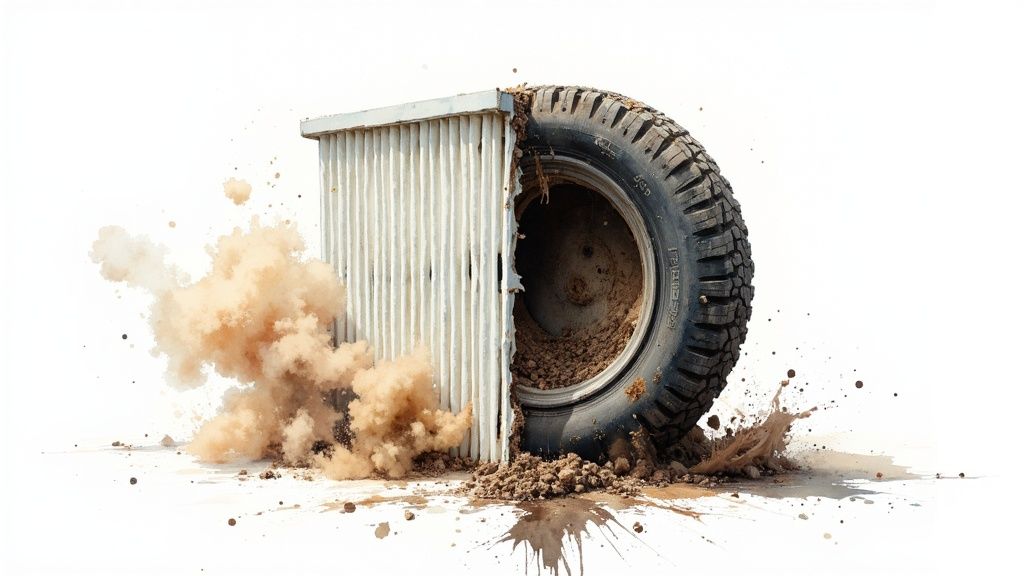
Warning Signs and Their Implications
The following table summarizes the potential repercussions of neglecting these warning signs:
To help you better understand the importance of maintaining clean air filters, we've compiled a table outlining the common warning signs:
Warning Signs of Air Filter Problems
This table presents the common symptoms of dirty or clogged air filters and their potential impact on vehicle performance and comfort.
| Warning Sign | Filter Type Affected | Potential Consequences | Urgency Level |
|---|---|---|---|
| Reduced Acceleration | Engine | Poor fuel economy, engine strain | Medium |
| Whistling Sound | Engine | Damage to engine components | High |
| Musty Smell | Cabin | Reduced air quality, allergies | Medium |
| Check Engine Light | Engine | Various engine problems | High |
| Black Smoke from Exhaust | Engine | Incomplete combustion, engine damage | High |
| Dirty Appearance | Both | Reduced filter efficiency | Medium |
As this table clearly illustrates, ignoring these warning signs can lead to significant issues ranging from reduced fuel efficiency to severe engine damage.
By recognizing these signs and conducting regular checks, you can proactively address air filter issues and prevent more serious problems, ensuring a long lifespan for your vehicle and a comfortable driving experience. If you're in the Haltom City, Texas, area and need assistance with air filter replacement or other car maintenance services, contact the certified technicians at Express Lube and Car Care. They offer expert advice and quality service.
DIY Filter Changes: When To Tackle It Yourself
Changing your car's air filter is often presented as a simple, money-saving DIY project. However, the ease of this task depends significantly on your vehicle. Some cars provide easy access to the air filter, while others bury it beneath a maze of components. This section explores the realities of DIY filter changes, helping you decide when to roll up your sleeves and when to seek professional assistance.
Assessing Your Vehicle's Filter Accessibility
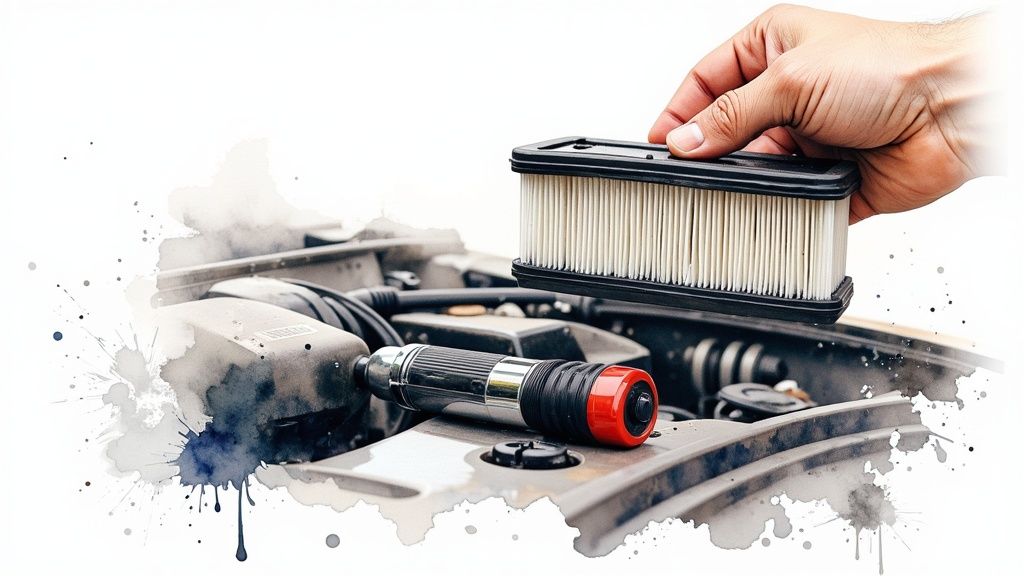
Begin by opening the hood and locating the air filter housing. This often appears as a black rectangular box secured with clips. If the housing is easy to reach and the clips appear straightforward to detach, you’re likely in a good position for a DIY change. But if the filter is hidden behind numerous hoses, wires, or other parts, the job may prove more complicated.
Cost Analysis: DIY vs. Professional Service
Professional air filter replacement costs can range from $20 at some quick lube shops to $50 or more at dealerships. A DIY replacement typically costs between $10 and $25 for the filter itself. This price difference makes DIYing attractive, especially with regular filter changes. However, if accessing the filter requires special tools or expertise, the risk of damaging other components could negate any cost savings.
Insider Tips for DIY Filter Changes
- Consult your owner's manual: It contains specific instructions and diagrams for your vehicle’s air filter location and replacement procedure.
- Use the correct filter: The wrong filter size or type can restrict airflow and damage your engine. Verify the correct filter for your car’s make and model using your owner’s manual or by consulting a parts store.
- Handle with care: Be gentle when removing and installing the filter to avoid damaging the housing or surrounding components.
- Note the orientation: Observe the airflow direction marked on the filter and ensure it’s installed correctly.
Common Mistakes to Avoid
- Forcing the filter: If the filter doesn't fit easily, don't force it. This could indicate the wrong filter or incorrect orientation.
- Overtightening: Overtightening the housing clips can break them. Secure them firmly, but avoid excessive force.
- Ignoring other components: While changing the air filter, take the opportunity to inspect nearby belts and hoses for wear and tear.
Knowing When To Call a Professional
While DIY filter changes are often manageable, professional assistance is sometimes the wisest choice. If you’re unsure about any step, or if your car’s filter is difficult to access, contacting a professional, such as Express Lube and Car Care in Haltom City, ensures the job is done correctly and efficiently. This is especially important for vehicles with complex engine layouts or those needing special tools for filter access. Ultimately, your comfort level and your vehicle’s design will dictate the best approach for how often to change your car's air filter.
Maximizing Filter Performance and Extending Lifespan
Regularly replacing your car's air filter is essential, but there's more to it than simply swapping it out every few months. This section explores advanced techniques for optimizing your air filter's performance and maximizing its lifespan, saving you money and improving your vehicle's overall performance.
Filter Cleaning and Reuse: Fact or Fiction?
Some drivers try to clean and reuse their air filters. While seemingly a cost-effective solution, it’s often not. The success of cleaning depends greatly on the filter type. For standard paper filters, cleaning isn’t recommended. Attempting to remove dirt often damages the filter media, hindering its ability to trap particles.
However, some high-performance, reusable filters are designed specifically for cleaning. These often come with dedicated cleaning kits and instructions. If you have a reusable filter, follow the manufacturer’s directions carefully. Incorrect cleaning can diminish effectiveness and potentially damage your engine.
Driving Habits and Filter Longevity
Your driving habits play a surprising role in your air filter's life. Frequent stop-and-go city driving exposes the filter to more pollutants than steady highway driving. Likewise, driving on unpaved roads substantially increases the dust and debris it must trap.
If you frequently drive in these conditions, more frequent filter changes are required. This might mean replacing your filter every 3,000 to 6,000 miles instead of the usual 12,000 to 15,000 miles.
Premium Filters: Separating Hype from Reality
The market offers a wide array of "premium" air filters promising enhanced performance. Some of these claims are legitimate, while others are just marketing tactics. Certain premium filters utilize advanced materials and innovative designs that genuinely improve filtration and prolong filter life. These can be a valuable investment for drivers in harsh environments.
However, many "premium" filters provide negligible benefits over standard ones. Before investing extra, thoroughly research the specific filter and its advertised features.
Complementary Maintenance: The Overlooked Essentials
Maintaining your car's air filter system involves more than just the filter itself. The filter housing and its seals are crucial for efficient filtration. Cracks or damage to the housing can allow unfiltered air to bypass the filter, entering the engine. Worn seals can create gaps, compromising the filter's ability to trap contaminants.
Regularly inspect the filter housing for damage and ensure the seals are intact. This simple step can significantly extend filter life and prevent costly engine issues.
Building a Complete Filtration Strategy
Ultimately, maximizing your car air filter's performance involves a multifaceted approach. Consider your typical driving conditions, your personal driving habits, and the type of filter you're using. Regularly inspect your filter and be aware of any warning signs, such as reduced engine performance or unusual engine sounds.
By understanding these interacting factors, you can create a tailored maintenance plan that protects both your engine and your wallet. For expert advice and professional air filter replacement in Haltom City, Texas, contact the skilled technicians at Express Lube and Car Care. They offer reliable maintenance services to keep your car in top condition.




